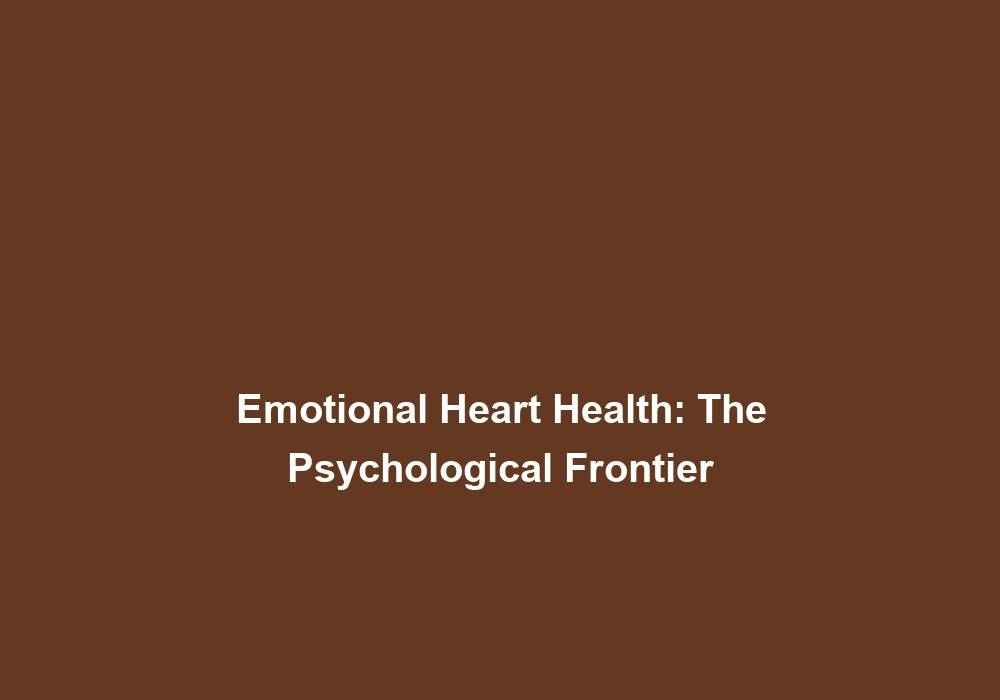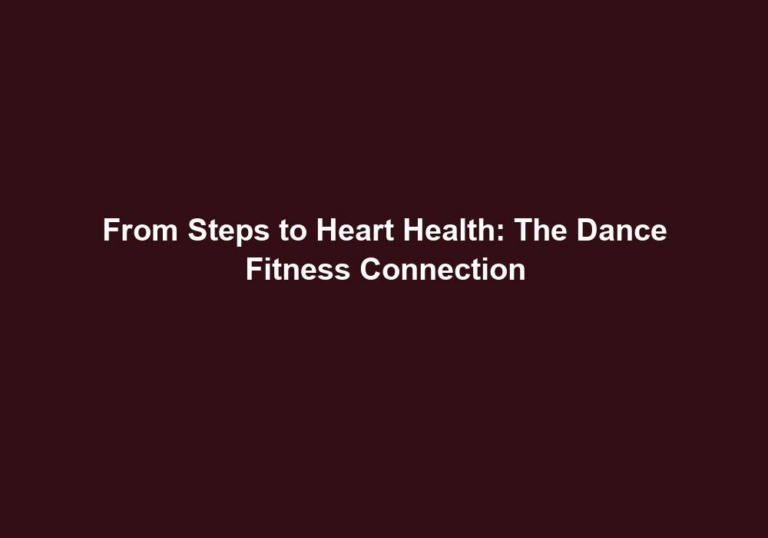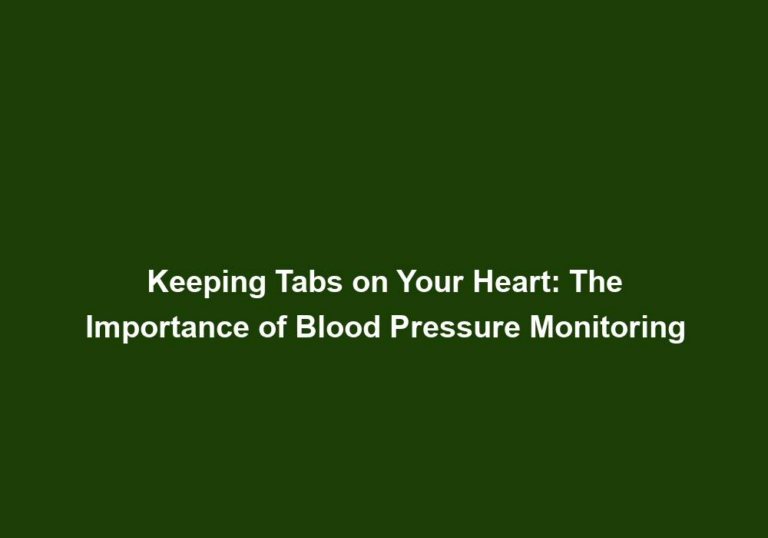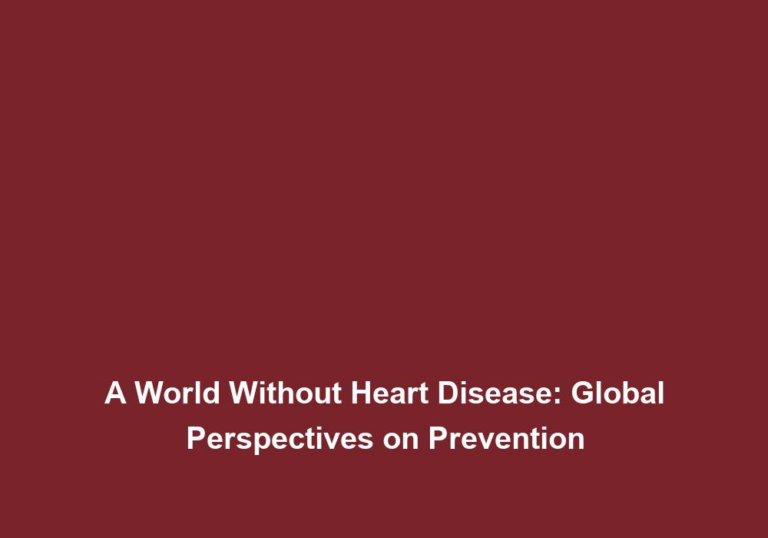Emotional Heart Health: The Psychological Frontier
The connection between our emotional well-being and physical health has long been acknowledged. In recent years, there has been a growing recognition of the impact that our emotions can have on our heart health. Emotional heart health is a fascinating and complex topic that delves into the intricate relationship between our minds and our hearts. In this article, we will explore the psychological frontier of emotional heart health and delve into ways to nurture a healthy heart through emotional well-being.
Understanding the Link
Research has shown that there is a strong connection between our emotional state and the health of our heart. Stress, anxiety, depression, and other negative emotions can have a detrimental effect on our cardiovascular system. When we experience stress, our bodies release stress hormones such as cortisol and adrenaline, which can increase heart rate, blood pressure, and inflammation. Prolonged exposure to these stress hormones can put a strain on our heart and increase the risk of heart disease.
On the other hand, positive emotions such as happiness, love, and gratitude have been linked to better heart health. Studies have found that individuals with a positive outlook on life have a lower risk of developing heart disease. It is clear that our emotional well-being plays a crucial role in maintaining a healthy heart.
The Impact of Stress on Heart Health
Stress is one of the major factors contributing to heart disease. Chronic stress can lead to unhealthy coping mechanisms such as overeating, smoking, or excessive alcohol consumption, all of which can increase the risk of heart problems. Moreover, stress can also directly impact our cardiovascular system by constricting blood vessels and increasing blood pressure.
To mitigate the negative effects of stress on our heart, it is essential to develop effective stress management techniques.
Here are some strategies to reduce stress levels and promote emotional well-being:
-
Engage in regular physical activity: Exercise is not only beneficial for physical health but also has a positive impact on emotional well-being. Aim for at least 150 minutes of moderate-intensity exercise per week, such as brisk walking, cycling, or swimming. Regular exercise releases endorphins, which are natural mood boosters.
-
Practice mindfulness and meditation: Mindfulness and meditation are powerful tools that can help reduce stress, promote relaxation, and enhance emotional well-being. Taking just a few minutes each day to sit quietly, focus on your breath, and observe your thoughts can have a profound impact on your heart health. There are numerous apps and online resources available that can guide you through mindfulness and meditation exercises.
-
Seek support from friends and family: Surrounding yourself with a strong support system can help reduce stress and provide emotional stability. Make an effort to spend quality time with loved ones, engage in meaningful conversations, and maintain healthy relationships.
-
Engage in activities you enjoy: Taking time for self-care and engaging in activities that bring you joy can significantly improve your emotional well-being and, consequently, your heart health. Whether it’s reading a book, practicing a hobby, or simply taking a relaxing bath, prioritize activities that help reduce stress and improve your mood.
Nurturing Emotional Well-being
Cultivating emotional well-being is a vital aspect of maintaining a healthy heart. Here are some practical steps you can take to nurture your emotional health:
- Practice Mindfulness and Meditation
Mindfulness and meditation are powerful tools that can help reduce stress, promote relaxation, and enhance emotional well-being. Taking just a few minutes each day to sit quietly, focus on your breath, and observe your thoughts can have a profound impact on your heart health. There are numerous apps and online resources available that can guide you through mindfulness and meditation exercises.
Some benefits of mindfulness and meditation include:
- Reducing stress and anxiety levels
- Improving sleep quality
- Enhancing self-awareness
- Increasing focus and concentration
- Cultivating a sense of calm and inner peace
- Foster Positive Relationships
Strong social connections and nurturing relationships have been shown to have a protective effect on heart health. Surrounding yourself with supportive and caring individuals can help reduce stress and provide emotional stability. Make an effort to spend quality time with loved ones, engage in meaningful conversations, and maintain healthy relationships.
Some ways to foster positive relationships include:
- Actively listening to others
- Expressing gratitude and appreciation
- Showing empathy and understanding
- Resolving conflicts in a constructive manner
- Supporting friends and family in times of need
- Engage in Regular Physical Activity
Physical activity not only benefits our physical health but also has a positive impact on our emotional well-being. Regular exercise releases endorphins, which are natural mood boosters. Aim for at least 150 minutes of moderate-intensity exercise per week, such as brisk walking, cycling, or swimming. Find activities that you enjoy and make them a regular part of your routine.
Some benefits of regular physical activity for emotional well-being include:
- Reducing symptoms of depression and anxiety
- Boosting self-confidence and self-esteem
- Improving cognitive function
- Promoting better sleep quality
- Enhancing overall mood and well-being
- Prioritize Self-Care
Taking care of yourself is essential for emotional well-being. Set aside time for activities that bring you joy, whether it’s reading a book, practicing a hobby, or simply taking a relaxing bath. Engaging in self-care activities can help reduce stress, improve mood, and promote overall emotional well-being.
Here are some self-care practices you can incorporate into your routine:
- Practicing relaxation techniques, such as deep breathing or progressive muscle relaxation
- Engaging in hobbies or creative outlets that bring you joy
- Setting boundaries and saying no to activities or commitments that drain your energy
- Getting enough restful sleep
- Eating a balanced diet and staying hydrated
- Seek Professional Help if Needed
If you are struggling with your emotional well-being and finding it difficult to manage stress or negative emotions on your own, do not hesitate to seek professional help. Mental health professionals, such as therapists or counselors, can provide valuable support and guidance to help you navigate challenging emotions and develop healthy coping strategies.
In conclusion, emotional heart health is an important aspect of overall well-being. Taking care of our emotional well-being through stress management, fostering positive relationships, regular physical activity, self-care, and seeking professional help when needed can significantly contribute to a healthy heart. By acknowledging the psychological frontier of emotional heart health, we can empower ourselves to lead fulfilling and heart-healthy lives.
(Note: Please note that this article is for informational purposes only and should not be considered as medical advice. If you have any concerns about your heart health, consult with a healthcare professional.)







